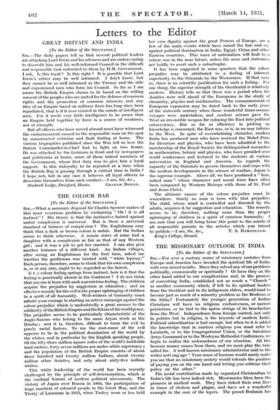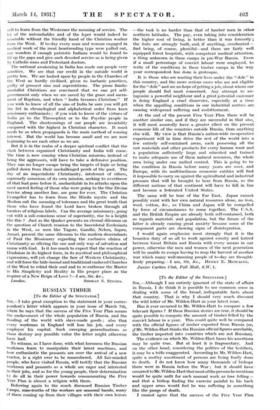THE MISSIONARY OUTLOOK IN INDIA
[To the Editor of the SPECTATOR.]
SIR,—For over a century scores of missionary societies from Europe and America have invaded the spiritual life of India, with very mixed results. Have they solved any of our problems politically, economically or spiritually ? Or have they on the other hand added to our complications and, in the process of converting India, established not so much a " Church " as another community which, if left to its spiritual leaders from the Occident and to its indigenous elders, would tend to become just as much of a minority problem as the Moslems or the Sikhs? Fortunately the younger generation of Indian Christians will have no religious exclusiveness, or narrow patriotism, or be tied to the apron strings of its benefactors from the West. Independence from foreign control, not only in politics but in religion, is the keynote of modern India. Political subordination is bad enough, but when to it is added the knowledge that in matters religious you must refer to Lambeth, or to the Congregational Union, or the Salvation Army Command or to the Wesleyan Methodist Conferences, we begin to realize the awkwardness of our situation. All this because money comes from there, and we must play the tune called for. A well-known missionary administrator said to the writer noti ong ago " Your sense of humour would surely make you see that no missionary society would tolerate the position of paying you on the one hand and letting you criticise -their policy on the other."
The social contribution made by organized Christendom to India's life has been indeed rich. Missionaries Illive been the
pioneers in medical work. They have risked their own lives in times of cholera and plague, and have set a wonderful example in the care of the lepers. The proud Brahmin has
still to learn from the Westerner the meaning of service. The. tot of the untouchables and of the leper would indeed be miserable without the friendly hand of the Christian worker from the West. If to-day every man and woman engaged in medical work of the most heartrending type were pulled out, one wonders if enough patriotic Indians would be found to fill up the gaps and give such devoted service as is being given by Catholic nuns and Protestant doctors.
The national awakening in India has made our people very sensitive. We see that our credit in the outside world is pretty low. We are looked upon by people in the Churches of the West as hardly civilized, given to barbaric practices, guilty of grossest sins and superstitions. The pious funda- mentalist Christians are convinced that we can get self- government only when we are - saved by the grace and sacra- ment of Baptism, and when " India becomes Christian." If you wish to know of all the sins of India be sure you will get the list in chronological and alphabetical order from keen missionary enthusiasts ; if you wish to know of the virtues of India go to the Theosophist or to the Psychic people in England. The shortcomings of our people are invariably compared with the highest in Christian character. It must needs be so when propaganda is the main method of rousing interest. But the world has become small and we are now beginning to see each other as we are.
But it is in the realm of a deeper spiritual conflict that the clash between organized Christianity and India will come. The time is now coming when Christian missions, instead of being the aggressors, will have to take a defensive position. They can no longer escape being the targets- of logic or being pulled down from their unchallenged perch of the past. The day of an imperialistic Christianity, intolerant of others, supremely conscious of its own mission, seeking to overthrow all that had gone before it, uncharitable in its attacks upon the most sacred feeling of those who were going to the One Divine Service along another line, are gone for ever. The Christian Evangelist has to learn from the Hindu mystic and the Moslem sufi the meaning of tolerance and the great truth that those who have found the Lord have broken through all barriers of religious labels. Can the average missionary, going out with a sub-conscious sense of superiority, rise to a height like this ? Just as the Quaker presents an eternal dilemma on the question of Church reunion to the Sacerdotal Ecelesiasts in the West, so men like Tagore, Gandhi, Nehru, Sapru, Ausari, present the same dilemma to the modern descendants of Paul the Missionary regarding the exclusive claims of Christianity as offering the one and only way of salvation and union with God. Is it too much to expect that the reaction of Hinduism in its highest form, .in its mystical and philosophical expressions, will yet change the face. of Western Christianity, and will force the hide-bound and traditional enslaved Churches of the. West to refind their soul and to re-enthrone the Master in His Simplicity and Reality in His proper place as the inspirer of a New Reign of Love ?—I am, Sir, &c.,
























































 Previous page
Previous page